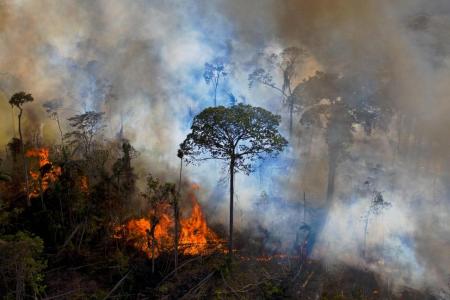Activists fear new deforestation pledge will be another broken promise
Experts warn new promise could fail unless backed by more funding, strict rules
KUALA LUMPUR: A new pledge by world leaders to halt deforestation by 2030 is likely to fail unless quickly backed by more funding, transparent monitoring and tough regulation of businesses and financiers linked to forest destruction, environmentalists warn.
More than 100 global leaders late on Monday pledged to halt and reverse deforestation and land degradation by the end of the decade, underpinned by US$19 billion (S$26 billion) in public and private funds to invest in protecting and restoring forests.
The commitment - made at the COP26 climate talks in Glasgow - included countries such as Brazil, Indonesia and the Democratic Republic of Congo, which collectively account for the majority of the world's tropical forests.
While broadly welcomed, many conservationists noted that similar zero deforestation pledges had repeatedly been made and not met by both governments and businesses.
Those include the 2014 New York Declaration on Forests, the United Nations sustainability goals and targets set by global household brands.
"While the Glasgow Declaration has an impressive range of signatories from across forest-rich countries, large consumer markets and financial centres, it nevertheless risks being a reiteration of previous failed commitments if it lacks teeth," said Ms Jo Blackman, head of forests policy and advocacy at London-based Global Witness.
"The question is whether (the) headline-grabbing announcements on deforestation will end up amounting to more of the same empty promises or if they will be followed up with the real regulatory action that is so urgently needed."
Last year, an area of tropical forest the size of the Netherlands was lost, according to monitoring service Global Forest Watch.
Although deforestation rates have fallen over the last two decades, about 10 million hectares are still lost each year, said Mr Tim Christophersen, who leads the United Nations Environment Programme's nature for climate branch.
"There is no shortage of these political commitments," he told the Thomson Reuters Foundation. "What there is a shortage of is the money and political will to make them happen."
Mr Kiki Taufik, global head of Greenpeace South-east Asia's Indonesian forests campaign, said the pledge committed to restoring an area of forests and cropland larger than India by 2030.
Instead, forests the size of Spain have been destroyed for commodities such as soy and palm oil since 2010.
Mr Ray Minniecon, an Australian Aboriginal pastor at COP26, said a lack of indigenous representatives in policy planning and negotiations was one reason efforts to protect land often did not work.
"Indigenous peoples know how to look after country, how to care for it and heal it and heal the people. Why aren't we at the table?" he asked. - REUTERS
Get The New Paper on your phone with the free TNP app. Download from the Apple App Store or Google Play Store now


